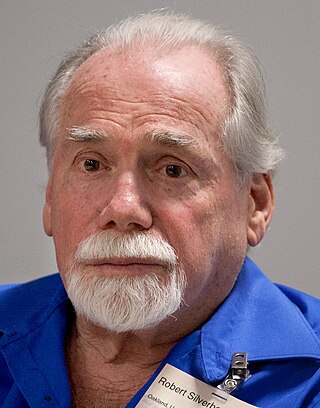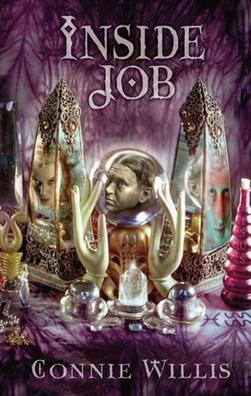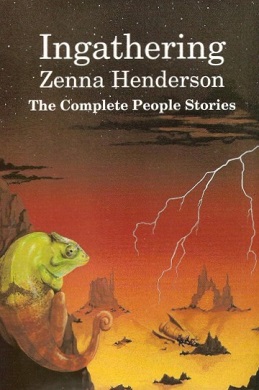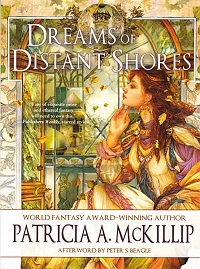
Eric Frank Russell was a British writer best known for his science fiction novels and short stories. Much of his work was first published in the United States, in John W. Campbell's Astounding Science Fiction and other pulp magazines. Russell also wrote horror fiction for Weird Tales and non-fiction articles on Fortean topics. Up to 1955 several of his stories were published under pseudonyms, at least Duncan H. Munro and Niall(e) Wilde.
The Heechee Saga, also known as the Gateway series, is a series of science fiction novels and short stories by Frederik Pohl. The Heechee are an advanced alien race that visited the Solar System hundreds of millennia ago and then mysteriously disappeared. They left behind bases containing artifacts, including working starships, which are discovered and exploited by humanity.

Robert Silverberg is a prolific American science fiction author and editor. He is a multiple winner of both Hugo and Nebula Awards, a member of the Science Fiction and Fantasy Hall of Fame, and a Grand Master of SF since 2004.

Catherine Ann Asaro is an American science fiction and fantasy author, singer and teacher. She is best known for her books about the Ruby Dynasty, called the Saga of the Skolian Empire.
Michael Francis Flynn was an American science fiction author. Nearly all of Flynn's work falls under the category of hard science fiction, although his treatment of it can be unusual since he applied the rigor of hard science fiction to "softer" sciences such as sociology in works such as In the Country of the Blind. Much of his short fiction appeared in Analog Science Fiction and Fact.
Robert David Reed is a Hugo Award-winning American science fiction author. He has a Bachelor of Science in Biology from the Nebraska Wesleyan University. Reed is an "extraordinarily prolific" genre short-fiction writer with "Alone" being his 200th professional sale. His work regularly appears in Asimov's, Fantasy & Science Fiction, and Sci Fiction. He has also published eleven novels. As of 2010, Reed lived in Lincoln, Nebraska with his wife and daughter.
Elaine Cunningham is an American fantasy and science fiction author, especially known for her contributions to the Dungeons & Dragons role playing game campaign setting of Forgotten Realms.

Inside Job is a novella by American writer Connie Willis, originally published in the January 2005 issue of Asimov's Science Fiction and later as a hardback by Subterranean Press. In the story, a debunker of pseudoscience encounters a fake medium who seems to be genuinely channelling the disruptive spirit of H. L. Mencken. It was the winner of the 2006 Hugo Award for Best Novella.

"Story of Your Life" is a science fiction novella by American writer Ted Chiang, first published in Starlight 2 in 1998, and later in 2002 in Chiang's collection of short stories, Stories of Your Life and Others. Its major themes are language and determinism.

Drowning World (2003) is a science fiction novel by American writer Alan Dean Foster.

Learning the World is a science fiction novel by British writer Ken MacLeod, published in 2005. It won the 2006 Prometheus Award, was nominated for the Hugo, Locus, Clarke, and Campbell Awards that same year, and received a BSFA nomination in 2005. Since the book's publication MacLeod has written two short stories set in the same universe, "Lighting Out" and "Who's Afraid of Wolf 359?".
Thomas P. Kratman is an American military science fiction author and retired United States Army officer whose work is published by Baen Books. Kratman's novels include the Desert Called Peace series which has been praised for its action sequences and attention to philosophy of war. He authored three novels with John Ringo in the Legacy of the Aldenata series. Kratman's works often reflect right-wing political perspectives and some have been seen as deliberately crafted to offend left-wing sensibilities. During the Sad Puppies campaign in 2015, Kratman was nominated for a Hugo Award for his novella Big Boys Don't Cry.

Axis is a science fiction novel by American-Canadian writer Robert Charles Wilson, published in 2007. It is a direct sequel to Wilson's Hugo Award-winning Spin, published two years earlier. The novel was a finalist for the 2008 John W. Campbell Award.

Nova Swing is a science fiction novel by M. John Harrison published in 2006. It takes place in the same universe as Light. The novel won the Arthur C. Clarke and Philip K. Dick Awards in 2007.

Daniel Andrew Wells is an American horror and science fiction author. Wells's first published novel, I Am Not a Serial Killer, was adapted into a movie in 2016.

Nebula Awards Showcase 2001 is an anthology of science fiction short works edited by Robert Silverberg. It was first published in hardcover and trade paperback by Harcourt in April 2001.

The Nebula Awards Showcase 2011 is an anthology of science fiction short works edited by American writer Kevin J. Anderson. It was first published in trade paperback and ebook by Tor Books in May 2011. The first British edition was published in trade paperback and ebook by Robinson in February 2012 under the alternate title The Mammoth Book of Nebula Awards SF.

Fonda Lee is a Canadian-American author of speculative fiction. She is best known for writing The Green Bone Saga, the first of which, Jade City, won the 2018 World Fantasy Award and was named one of the 100 Best Fantasy Books of All Time by Time magazine. The Green Bone Saga was also included on NPR's list, "50 Favorite Sci-Fi and Fantasy Books of the Past Decade".

Ingathering: The Complete People Stories, also known as Ingathering: The Complete People Stories of Zenna Henderson, is a 1995 collection of science fiction stories by American science fiction and fantasy author Zenna Henderson. It was edited by Mark L. Olson and Priscilla Olson and published in Massachusetts by the New England Science Fiction Association's NESFA Press as part of their "Choice series". The book contains all seventeen stories Henderson wrote about the People, a group of benevolent human aliens stranded on Earth and struggling to fit in.

Dreams of Distant Shores is a collection of fantasy stories by Patricia A. McKillip. It was first published on ebooks by Tachyon Publications in May 2016, with the trade paperback print edition following from the same publisher in June 2016.















